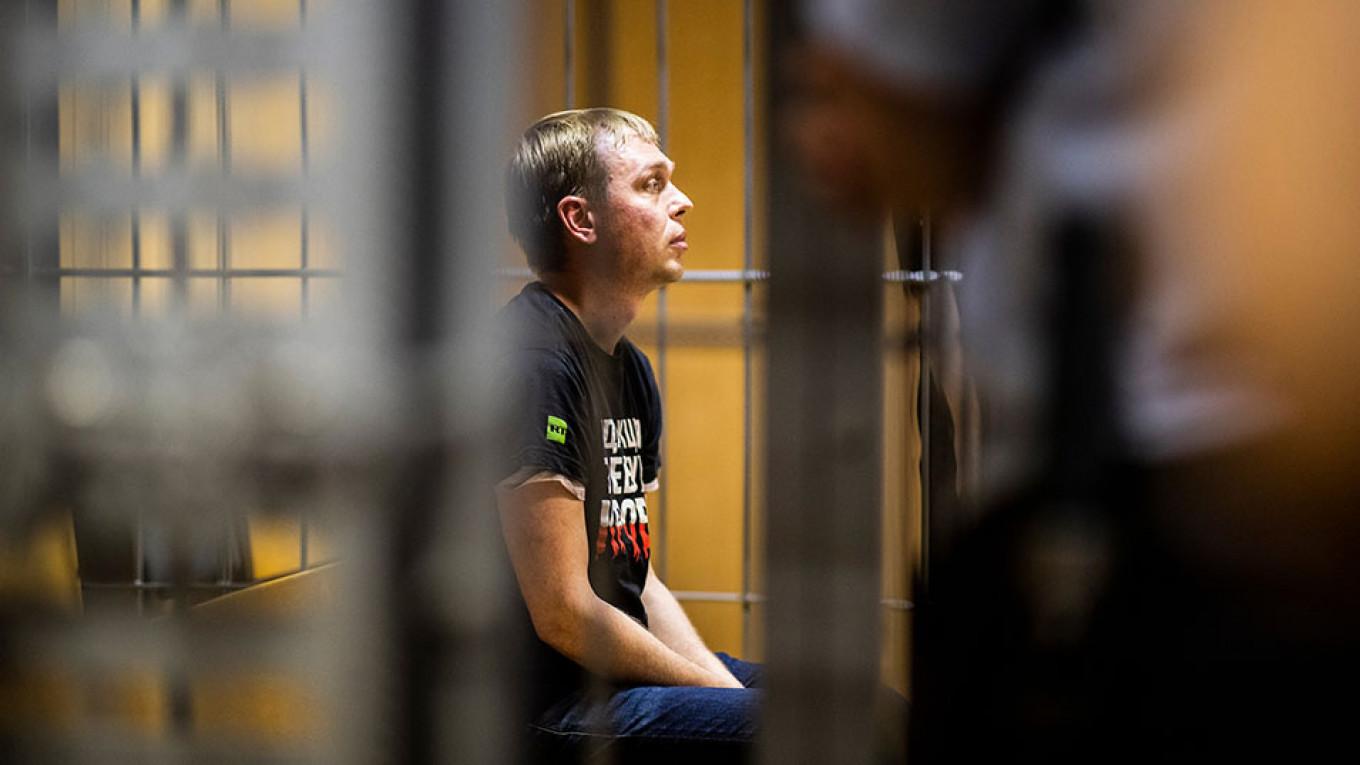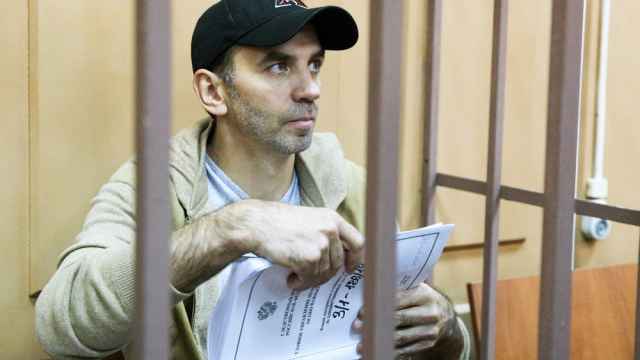Ivan Golunov is free, and that is a very good thing — and yet it may signal more dangerous times to come for Russian journalists.
Golunov — an investigative journalist for Meduza who was arrested on drugs charges — was released and saw his charges dropped after an unprecedented public mobilization in his support. Whether this will turn out to be a lasting break in the weather or simply the quiet before a storm, however, remains to be seen. There are more unknowables in the Golunov story than there are facts, unfortunately.
We do not and cannot know who instigated his arrest, or why. We do not and cannot know precisely why his arrest — unlike that of Chechen human rights activist Oyub Titiyev or so many others, unlike the evisceration of newsrooms at Kommersant or RBC or Lenta.ru or RIA Novosti or NTV, unlike the murders of journalists Anna Politkovskaya or Anastasia Baburova or Paul Khlebnikov — brought so many people into the streets, real and virtual, to protest.
We can ask the editors of Vedomosti and Kommersant and RBK why this was finally the time for solidarity, and they may answer, but do even they really know?
For the moment, then, let’s concentrate on what we do know. We know that Golunov is far from alone. Every year, an untold number of Russian citizens find themselves the targets of fabricated investigations — often, but far from always involving narcotics – simply because they got in somebody’s way.
As the sociologist Ella Paneyakh and colleagues have shown through painstaking research, the way the Russian legal system operates makes it an ideal service provider for those with a Golunov-shaped problem to solve. Under-resourced and over-managed police indulge in a culture of corner-cutting, knowing both that it’s the surest way of meeting their targets, and that the courts will avoid an acquittal at all costs. The prosecutors, who have their own targets, do the same. And so do the courts.
The opportunity for ‘problem-solving’ is obvious. In this sea of stitched-up cases, what’s one more? How would a judge — so accustomed to convicting on shoddy evidence and botched procedure — distinguish the needle in the haystack? In fact, as Paneyakh has shown, once the system grabs hold of a case, the bureaucratic inertia is so strong that it very rarely lets go. Thus supply meets demand.
This market is great for solving commercial disputes: just ask Michael Calvey. But it just as easily allows for prosecutions of opponents, from Mikhail Khodorkovsky through to Alexey Navalny and hundreds of local bugbears, on charges large and small, without fear of loss. As a result, Kremlin and its political allies throughout the country — from the federal government down to the remotest municipality — find this market useful, as well. Until they don’t.
For whatever reason, the Golunov case went wrong — or right, depending on your point of view. For Golunov and his supporters, this will feel like a watershed moment, and it should. Public pressure led directly to the release of a political prisoner and the exoneration of an innocent man.
That doesn’t happen every day, even in democratic countries. Even if the Kremlin acquiesced for cynical reasons, seeking to win points for its sudden magnanimity, it’s worth remembering that no such magnanimity would have been required had the street not demanded it. Many Russians (including probably most readers of this column) will see that as a win.
But it’s worth remembering that some Russians will not.
People who have problems to solve — problems that look like Golunov and Titiyev — face a potentially changed landscape. Is the problem-solving service that had worked so well for so long off the market?
Like so much else in modern authoritarianism, where the rules are assumed rather than written, no one can give them an answer to that question. The police will not receive a clear order instructing them to stop fabricating cases, just as they never received unambiguous instructions to fabricate them in the first place. The same goes for prosecutors and judges. Everybody is going to have to work this out on their own.
Put yourself in the uncomfortable shoes of the kind of people who “ordered” Golunov, people who come to the police with a problem in search of a solution.
Your problems, of course, haven’t gone away. If anything, investigative journalists may now feel a bit more emboldened.
Out of habit, then, you come with your problem to the police, like you and your colleagues have so many times before. Maybe the police are gun shy, in which case you need to find different police — or a different solution. Or maybe the police tell you there’s nothing to worry about, that Golunov was a one-off, lightning doesn’t strike twice. Do you believe them?
On any market, people prefer to purchase goods and services that seem dependable. No one wants a washing machine that has a good chance of breaking, or an electrician who may or may not know how to avoid causing a fire. This market is no different.
As a result, if Russia’s police and judiciary can no longer provide the problem-solving services to which clients have become accustomed, those clients will look elsewhere in search of more reliable solutions. That may not bode well for the Golunovs of the world.
Security for Russia’s inconvenient voices cannot come from giving special dispensation to individuals or even categories, because that will only distort the market.
A better outcome cannot be achieved simply by keeping Golunov or Titiyev or even Calvey out of jail.
What is needed is real judicial reform, such that Russia’s less scrupulous politicians and businessmen will find themselves unable to purchase punishment or impunity. Maybe then they’ll learn that problems like Golunov are simply unsolvable.
A Message from The Moscow Times:
Dear readers,
We are facing unprecedented challenges. Russia's Prosecutor General's Office has designated The Moscow Times as an "undesirable" organization, criminalizing our work and putting our staff at risk of prosecution. This follows our earlier unjust labeling as a "foreign agent."
These actions are direct attempts to silence independent journalism in Russia. The authorities claim our work "discredits the decisions of the Russian leadership." We see things differently: we strive to provide accurate, unbiased reporting on Russia.
We, the journalists of The Moscow Times, refuse to be silenced. But to continue our work, we need your help.
Your support, no matter how small, makes a world of difference. If you can, please support us monthly starting from just $2. It's quick to set up, and every contribution makes a significant impact.
By supporting The Moscow Times, you're defending open, independent journalism in the face of repression. Thank you for standing with us.
Remind me later.








